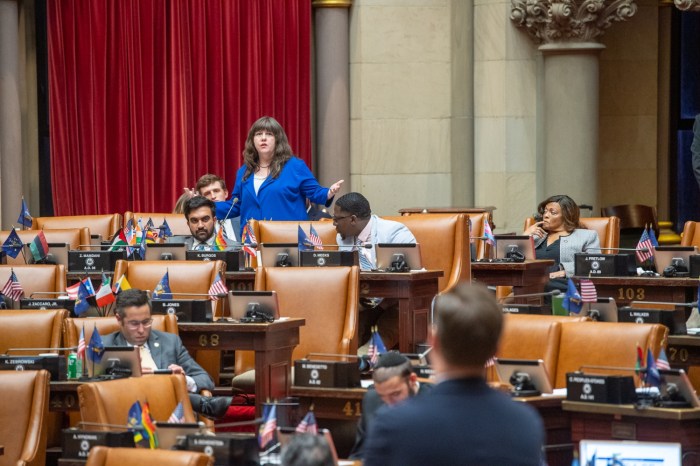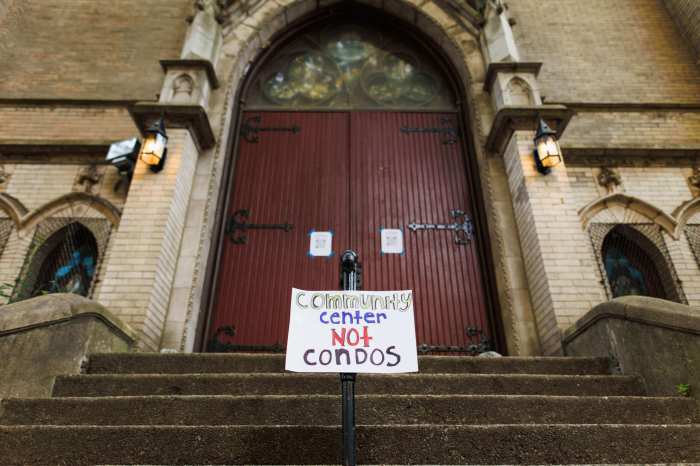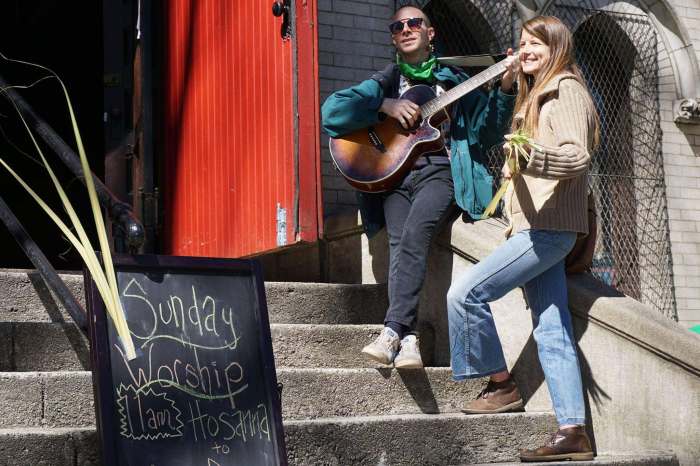Meeting Member Emily Gallagher has launched a brand new invoice that may tighten the principles across the sale of spiritual properties in New York State after Greenpointers stated goodbye to each a church and the neighborhood packages it hosted.
The three-year wrestle between neighborhood members and the Metropolitan New York Synod over the closure of the beloved Park Church Co-Op resulted in December, when a state Supreme Court docket Choose allowed the Synod to promote the church to a developer.
Park Church Co-Op offered after a prolonged struggle
Park Church Co-Op closed its doorways in 2022, after the Synod — which oversees a whole lot of Lutheran church buildings in New York State — pulled funding for the congregation, citing dear structural points and a small variety of worshippers.
Within the months earlier than the church closed and within the practically two years since, Greenpointers fought first to maintain the church open, then to halt the sale in a bid to purchase the constructing themselves.
Park Church Co-Op hosted a lot of neighborhood packages along with non secular providers, together with music courses, after-school packages, live shows, a soup kitchen, and a drop-in shelter. With out the church, locals stated, these packages would have nowhere to go.
For some, that has proved to be true. Concetta Abbate began as a musician at Park Church in 2014, and in addition ran her small music college, Teacup Music, out of the church till 2022.
Since then, she has been educating on Humboldt Avenue a block away from the church in a studio run by a pal, paying an inexpensive lease.
Now, that constructing is being offered. Abbate would solely be capable to afford to pay lease in Greenpoint if she launched a bigger music college, she stated, so she’s closing down Teacup Music and can as a substitute educate classes on a smaller scale in Queens.
In December, the courtroom allowed the Synod to promote the 129 Russell St. church to developer GW Russell LLC, an offshoot of GW Equities LLC, for $4.7 million.
In line with permits filed with the Division of Buildings, the developer plans to transform the church constructing right into a three-story, ten-unit condominium constructing. It’s not clear from the paperwork filed how a lot of the unique constructing will stay — the allow utility is for a partial demolition, and notes that no more than 50% of the gross ground space could be demolished.
Berish Wagschal, the pinnacle of GW Equities LLC, didn’t reply to a number of requests for remark concerning the sale or the way forward for the church constructing, nor did a consultant for the Metropolitan New York Synod.
Begins and stops
Gallagher, who represents Williamsburg and Greenpoint within the Meeting, stated she had been concerned with neighborhood occasions on the church for years earlier than she was elected in 2020, and knew the church had been struggling when information broke that the Synod meant to shut it in 2021.
Early on, she contacted the workplace of Legal professional Basic Letitia James.
Below state legislation, the Legal professional Basic is required to supervise the sale of property owned by church buildings and different non secular organizations to make sure the sale “serves the best interest of the entity and its members.”
“They were really constrained by law, because they could not consider a range of important factors,” Gallagher stated. “Because in the law, all it said was about the religious corporation and the interest of the church and its members. For the church, getting a massive chunk of money was in the interest of the church as an institution.”

Final summer season, after being requested to approve the sale, the AG’s workplace requested the courtroom to carry a listening to, because the workplace had acquired “a number of complaints objecting to [the] proposed sale of the Property due to the perceived negative impact on the Greenpoint, Brooklyn community.”
The decide agreed, permitting locals to testify in help of the church. James later briefly paused the sale, and a bunch of locals labored to place collectively their very own bid on the property. They acquired a lot of pledges to help their proposed nonprofit, Commonplace, which might have operated the previous church as a neighborhood heart.
Jamie Hook, who spearheaded the Commonplace effort, stated he was heartened to know that individuals had been prepared to pledge and help the trigger, even when it didn’t pan out how that they had hoped.
“But obviously the thing that is really critical in those situations is both time and the mechanisms to turn that pledge of support into a viable offer in the real estate market,” Hook stated. “The most important thing that those efforts need is time, and that’s what the [Assembly Member’s] bill essentially offers.”
Gallagher’s new invoice
The invoice, A10232, would alter present legislation in order that non secular establishments, when petitioning the Legal professional Basic to promote their property, must embody a listing of neighborhood providers the church is used for — like donation assortment and distribution, shelter, childcare, and neighborhood conferences.
When contemplating the sale, the Legal professional Basic must think about not solely the impression the sale would have on the establishment, however on the neighborhood.
If the AG did discover that it could negatively have an effect on the neighborhood, the invoice would have them maintain a public listening to and delay the sale till both locals might put collectively their very own supply on the property or till the establishment might assure these neighborhood providers might proceed.

“If this new law had been there, the church and the buyer would have had to say, ‘OK, we are going to include a community space, or we’re going to work out a community space for you to use for the childcare, for the music lessons, for all of those things,’” Gallagher stated.
Greenpoint, like many neighborhoods, is quickly shedding free neighborhood areas in addition to native historical past, the Meeting Member stated. Many are solely out there for sure functions, or at sure instances, or should be rented out – not used free of charge.
“It’s created a sad situation where we now have way more people living here than we did in the past, but we have way fewer third spaces, and we have almost no third places,” Gallagher stated. “It’s a real problem when it comes to quality of life and also for community organizing.”
That features church buildings, which, Hook stated, usually cater to a slew of neighborhood wants, like Park Church Co-Op did. However church buildings and different non secular organizations are going through steep losses in membership throughout the U.S., forcing some to shutter or condense congregations and spiritual colleges.
The lack of church buildings and ‘third spaces’ in New York Metropolis
Three Catholic colleges in Brooklyn are closing this yr, largely because of falling enrollment and poor funds. Upstate, the Roman Catholic Diocese of Buffalo plans to shut or merge as many as 50 church buildings.
The Metropolitan New York Synod has closed and offered a lot of church buildings in New York Metropolis since 2019.
St. Peter’s Evangelical Lutheran Church within the Bronx which confronted monetary and structural points not dissimilar to these at Park Church, closed in 2019. Parishioners informed the Mott Haven Herald on the time that the church’s meals pantry, which was additionally compelled to shut, was a “lifeline.”
Two years later, the Kingsbridge Evangelical Lutheran Church, additionally within the Bronx, was closed and offered. The Eltingville Lutheran Church and its college had been demolished final yr after a protracted stretch of monetary points.
In a 2019 lawsuit, the Eltingville Church Council claimed the Synod was illegally trying to take over the deed to the property with a purpose to promote, however the go well with was tossed in 2020.
Abbate’s music college was one in every of a number of packages to relocate after Park Church closed. Sing LIC, which ran a kids’s choir out of the area, moved again to Queens. Eckford Avenue Studio discovered a brand new dwelling at Greenpoint Reformed Church throughout the neighborhood. The drop-in shelter is not any extra, and the free live shows on the church steps have gone away.

“I would say mostly things are just not happening anymore,” Abbate stated. “The congregation has dispersed … it did basically dissipate, like the core community that was there. Space is really important, physical space is very important.”
Gallagher acknowledged that in some instances, the church could also be in dire want of cash. Some native homes of worship have modified their modes of operation, she stated, and lease out their areas at a low value to make some extra cash.
The state isn’t in a position to give church buildings cash for repairs due to the separation of church and state, she stated, and there’s a “lingering problem” with the lack of non secular identification and communities.
Hook stated that although the neighborhood had not been in a position to save Park Church, he nonetheless noticed the outpouring of help and Gallagher’s invoice as a hit.
“If this bill gets any traction, if it gets passed, then we will have changed the outcome for another church in the future,” he stated. “It may be that churches themselves aren’t taking up this mantle with quite the vigor that they once did in the past, but that doesn’t mean the need is any lesser. And I think it’s up to us to get organized in a somewhat more secularized world to create these third spaces.”
“Well bless their hearts.”












